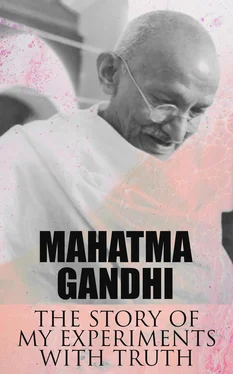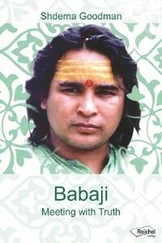Mahatma Gandhi - The Story of My Experiments with Truth
Здесь есть возможность читать онлайн «Mahatma Gandhi - The Story of My Experiments with Truth» — ознакомительный отрывок электронной книги совершенно бесплатно, а после прочтения отрывка купить полную версию. В некоторых случаях можно слушать аудио, скачать через торрент в формате fb2 и присутствует краткое содержание. Жанр: unrecognised, на английском языке. Описание произведения, (предисловие) а так же отзывы посетителей доступны на портале библиотеки ЛибКат.
- Название:The Story of My Experiments with Truth
- Автор:
- Жанр:
- Год:неизвестен
- ISBN:нет данных
- Рейтинг книги:5 / 5. Голосов: 1
-
Избранное:Добавить в избранное
- Отзывы:
-
Ваша оценка:
- 100
- 1
- 2
- 3
- 4
- 5
The Story of My Experiments with Truth: краткое содержание, описание и аннотация
Предлагаем к чтению аннотацию, описание, краткое содержание или предисловие (зависит от того, что написал сам автор книги «The Story of My Experiments with Truth»). Если вы не нашли необходимую информацию о книге — напишите в комментариях, мы постараемся отыскать её.
The Story of My Experiments with Truth — читать онлайн ознакомительный отрывок
Ниже представлен текст книги, разбитый по страницам. Система сохранения места последней прочитанной страницы, позволяет с удобством читать онлайн бесплатно книгу «The Story of My Experiments with Truth», без необходимости каждый раз заново искать на чём Вы остановились. Поставьте закладку, и сможете в любой момент перейти на страницу, на которой закончили чтение.
Интервал:
Закладка:
III CHILD MARRIAGE
Table of Contents
Much as I wish that I had not to write this chapter, I know that I shall have to swallow many such bitter draughts in the course of this narrative. And I cannot do otherwise, if I claim to be a worshipper of Truth. It is my painful duty to have to record here my marriage at the age of thirteen. As I see the youngsters of the same age about me who are under my care, and think of my own marriage, I am inclined to pity myself and to congratulate them on having escaped my lot. I can see no moral argument in support of such a preposterously early marriage.
Let the reader make no mistake. I was married, not betrothed. For in Kathiawad there are two distinct rites,—betrothal and marriage. Betrothal is a preliminary promise on the part of the parents of the boy and the girl to join them in marriage, and it is not inviolable. The death of the boy entails no widowhood on the girl. It is an agreement purely between the parents, and the children have no concern with it. Often they are not even informed of it. It appears that I was betrothed thrice, though without my knowledge. I was told that two girls chosen for me had died in turn, and therefore I infer that I was betrothed three times. I have a faint recollection, however, that the third betrothal took place in my seventh year. But I do not recollect having been informed about it. In the present chapter I am talking about my marriage, of which I have the clearest recollection.
It will be remembered that we were three brothers. The first was already married. The elders decided to marry my second brother, who was two or three years my senior, a cousin, possibly a year older, and me, all at the same time. In doing so there was no thought of our welfare, much less our wishes. It was purely a question of their own convenience and economy.
Marriage among Hindus is no simple matter. The parents of the bride and the bridegroom often bring themselves to ruin over it. They waste their substance, they waste their time. Months are taken up over the preparations—in making clothes and ornaments and in preparing budgets for dinners. Each tries to outdo the other in the number and variety of courses to be prepared. Women, whether they have a voice or no, sing themselves hoarse, even get ill, and disturb the peace of their neighbours. These in their turn quietly put up with all the turmoil and bustle, all the dirt and filth, representing the remains of the feasts, because they know that a time will come when they also will be behaving in the same manner.
It would be better, thought my elders, to have all this bother over at one and the same time. Less expense and greater eclat. For money could be freely spent if it had only to be spent once instead of thrice. My father and my uncle were both old, and we were the last children they had to marry. It is likely that they wanted to have the last best time of their lives. In view of all these considerations, a triple wedding was decided upon, and as I have said before, months were taken up in preparation for it.
It was only through these preparations that we got warning of the coming event. I do not think it meant to me anything more than the prospect of good clothes to wear, drum beating, marriage processions, rich dinners and a strange girl to play with. The carnal desire came later. I propose to draw the curtain over my shame, except for a few details worth recording. To these I shall come later. But even they have little to do with the central idea I have kept before me in writing this story.
So my brother and I were both taken to Porbandar from Rajkot. There are some amusing details of the preliminaries to the final drama—e.g. smearing our bodies all over with turmeric paste—but I must omit them.
My father was a Diwan, but nevertheless a servant, and all the more so because he was in favour with the Thakore Saheb. The latter would not let him go until the last moment. And when he did so, he ordered for my father special stage coaches, reducing the journey by two days. But the fates had willed otherwise. Porbandar is 120 miles from Rajkot,—a cart journey of five days. My father did the distance in three, but the coach toppled over in the third stage, and he sustained severe injuries. He arrived bandaged all over. Both his and our interest in the coming event was half destroyed, but the ceremony had to be gone through. For how could the marriage dates be changed? However, I forgot my grief over my father’s injuries in the childish amusement of the wedding.
I was devoted to my parents. But no less was I devoted to the passions that flesh is heir to. I had yet to learn that all happiness and pleasure should be sacrificed in devoted service to my parents. And yet, as though by way of punishment for my desire for pleasures, an incident happened, which has ever since rankled in my mind and which I will relate later. Nishkulanand sings: ‘Renunciation of objects, without the renunciation of desires, is shortlived, however hard you may try.’ Whenever I sing this song or hear it sung, this bitter untoward incident rushes to my memory and fills me with shame.
My father put on a brave face in spite of his injuries, and took full part in the wedding. As I think of it, I can even today call before my mind’s eye the places where he sat as he went through the different details of the ceremony. Little did I dream then that one day I should severely criticize my father for having married me as a child. Everything on that day seemed to me right and proper and pleasing. There was also my own eagerness to get married. And as everything that my father did then struck me as beyond reproach, the recollection of those things is fresh in my memory. I can picture to myself, even today, how we sat on our wedding dais, how we performed the Saptapadi, 4how we, the newly wedded husband and wife, put the sweet Kansar 5into each other’s mouth, and how we began to live together. And oh! that first night. Two innocent children all unwittingly hurled themselves into the ocean of life. My brother’s wife had thoroughly coached me about my behaviour on the first night. I do not know who had coached my wife. I have never asked her about it, nor am I inclined to do so now. The reader may be sure that we were too nervous to face each other. We were certainly too shy. How was I to talk to her, and what was I to say? The coaching could not carry me far. But no coaching is really necessary in such matters. The impressions of the former birth are potent enough to make all coaching superfluous. We gradually began to know each other, and to speak freely together. We were the same age. But I took no time in assuming the authority of a husband.
IV PLAYING THE HUSBAND
Table of Contents
About the time of my marriage, little pamphlets costing a pice, or a pie (I now forget how much), used to be issued, in which conjugal love, thrift, child marriages, and other such subjects were discussed. Whenever I came across any of these, I used to go through them from cover to cover, and it was a habit with me to forget what I did not like, and to carry out in practice whatever I liked. Lifelong faithfulness to the wife, inculcated in these booklets as the duty of the husband, remained permanently imprinted on my heart. Furthermore, the passion for truth was innate in me, and to be false to her was therefore out of the question. And then there was very little chance of my being faithless at that tender age.
But the lesson of faithfulness had also an untoward effect. ‘If I should be pledged to be faithful to my wife, she also should be pledged to be faithful to me,’ I said to myself. The thought made me a jealous husband. Her duty was easily converted into my right to exact faithfulness from her, and if it had to be exacted, I should be watchfully tenacious of the right. I had absolutely no reason to suspect my wife’s fidelity, but jealousy does not wait for reasons. I must needs be for ever on the look-out regarding her movements, and therefore she could not go anywhere without my permission. This sowed the seeds of a bitter quarrel between us. The restraint was virtually a sort of imprisonment. And Kasturbai was not the girl to brook any such thing. She made it a point to go out whenever and wherever she liked. More restraint on my part resulted in more liberty being taken by her, and in my getting more and more cross. Refusal to speak to one another thus became the order of the day with us, married children. I think it was quite innocent of Kasturbai to have taken those liberties with my restrictions. How could a guileless girl brook any restraint on going to the temple or on going on visits to friends? If I had the right to impose restrictions on her, had not she also a similar right? All this is clear to me today. But at that time I had to make good my authority as a husband!
Читать дальшеИнтервал:
Закладка:
Похожие книги на «The Story of My Experiments with Truth»
Представляем Вашему вниманию похожие книги на «The Story of My Experiments with Truth» списком для выбора. Мы отобрали схожую по названию и смыслу литературу в надежде предоставить читателям больше вариантов отыскать новые, интересные, ещё непрочитанные произведения.
Обсуждение, отзывы о книге «The Story of My Experiments with Truth» и просто собственные мнения читателей. Оставьте ваши комментарии, напишите, что Вы думаете о произведении, его смысле или главных героях. Укажите что конкретно понравилось, а что нет, и почему Вы так считаете.












